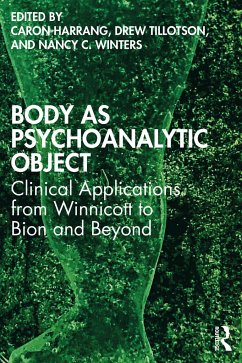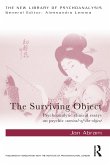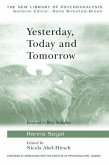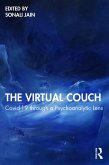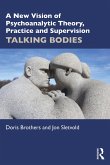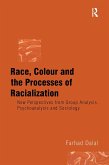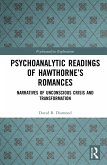Winner of the 2022 Gradiva® Award for Best Edited Book!
This book explores the role of bodily phenomena in mental life and in the psychoanalytic encounter, encouraging further dialog within psychoanalysis, philosophy, and the humanities, and contributing new clinical and theoretical perspectives to the recent resurgence of psychoanalytic interest in the body.
Presented in six parts in which diverse meanings are explored, Body as Psychoanalytic Object focuses on the clinical psychoanalytic encounter and the body as object of psychoanalytic inquiry, spanning from the prenatal experience to death. The contributors explore key themes including mind-body relations in Winnicott, Bion, and beyond; oneiric body; nascent body in early object relations; body and psychosensory experience; body in breakdown; and body in virtual space. With clinical vignettes throughout, each chapter provides unique insight into how different analysts work with bodily phenomena in the clinical situation and how it is conceived theoretically.
Building on the thinking of Winnicott and Bion, as well as contributions from French psychoanalysis, Body as Psychoanalytic Object offers a way forward in a body-based understanding of object relations theory for psychoanalysts and psychotherapists.
This book explores the role of bodily phenomena in mental life and in the psychoanalytic encounter, encouraging further dialog within psychoanalysis, philosophy, and the humanities, and contributing new clinical and theoretical perspectives to the recent resurgence of psychoanalytic interest in the body.
Presented in six parts in which diverse meanings are explored, Body as Psychoanalytic Object focuses on the clinical psychoanalytic encounter and the body as object of psychoanalytic inquiry, spanning from the prenatal experience to death. The contributors explore key themes including mind-body relations in Winnicott, Bion, and beyond; oneiric body; nascent body in early object relations; body and psychosensory experience; body in breakdown; and body in virtual space. With clinical vignettes throughout, each chapter provides unique insight into how different analysts work with bodily phenomena in the clinical situation and how it is conceived theoretically.
Building on the thinking of Winnicott and Bion, as well as contributions from French psychoanalysis, Body as Psychoanalytic Object offers a way forward in a body-based understanding of object relations theory for psychoanalysts and psychotherapists.
"It is paradoxical and intriguing that after a century of existence psychoanalysis is still so uncomfortable saying what it knows about the body. Paradoxical because psychoanalysis was born giving voice to the body of hysterics. Yet over time, the picture became that of a disincarnate analyst for a disincarnate patient, prompting Paula Heimann to remind us the purpose of psychoanalysis is not to transform the analyst into a mechanical brain, which produces interpretations purely on the basis of intellectual procedures. In her classic 1949 essay on countertransference, Heimann denounces a split not yet resolved in psychoanalytic theorizing on the link between mind and body. Otherwise one would not understand why a book like Body as psychoanalytic object can be so intriguing. The fact is, this remains an exciting frontier of research in psychoanalysis. How body and mind communicate remains quite mysterious. We know that the body that interests us does not speak in words; still it 'speaks' and cannot be placed entirely outside the field of the symbolic even when it is deprived of the ability to communicate lexically, as is the case with small children. It is not at all obvious that even the body of the infant, that is, the child who does not yet have access to words, is already touched by culture; which means that it starts immediately (even before birth) to exist as a body that has its own intentionality, a body that dreams, a body that communicates. Nor is it clear what relation there is between intersubjectivity based on instinct, what Bion calls the proto-mental system-the ability of individuals to connect with each other on the basis of certain 'valences'-and intersubjectivity based on language. This outstanding book co-authored and edited by Caron Harrang, Drew Tillotson, and Nancy Winters promises readers an extraordinary journey in which, little by little, they will be able to reflect on these issues and see them in the light of a series of rigorous, provocative, and sophisticated essays that make up the volume. I recommend this splendid book to psychotherapists, to psychoanalysts, and to all those in philosophy and the humanities who reflect on the mystery of what constitutes the essence of our humanity." - Giuseppe Civitarese, MD, FIPA, author of Sublime Subjects: Aesthetic Experience and Intersubjectivity in Psychoanalysis
"In this theoretically intricate, clinically rich and challenging collection of essays, edited by Caron Harrang, Drew Tillotson and Nancy Winters, we are exposed to new and evolving ideas on the creative forms of body-mind engagement. With Bion and Winnicott as guiding lodestars, authors here take us on fascinating journeys. Body-mind emergence in prenatal and perinatal life, at the end of life, in the process of growth and development, at points of breakdown, and even, quite presciently, in the transformed clinical scenes of teletherapy and screens. I was struck by the complexity and challenge of the many clinical moments in this book, used to push the reader towards new imaginings of the body and mind in their complex and profound encountering. We are presented here with troubling and inspiring stories, through a complex theoretical perspective in which psychoanalysis is about opening the capacity to dream, to need, to want, as well as to know." - Adrienne Harris, PhD, Director, Sandor Ferenczi Center of the New School
"Body as Psychoanalytic Object: Clinical Applications from Winnicott to Bion and Beyond is a sparkling collection of essays. Its varied authors engage the complexities of embodiment as patient and analyst live these in the consulting room, taking up and diving deep into the conscious and unconscious body, its sensory, related, affective, oneiric, and biologic presentations. Building on the foundational thinking of Winnicott and Bion as well as contributions from French psychoanalysis, these authors redress the relative scotomization of the body in psychoanalysis, turning their collective clinical attention to the body present from before birth through infancy and into illness and death. In these pages, concentration on the vulnerable, mortal body reveals what it is to be alive, breathing, present, human." - Bruce Reis, PhD, FIPA is Regional Editor for North America at the IJP; training and supervising psychoanalyst, IPTAR, New York City
"Since Freud's seminal insight that the ego is 'first and foremost a body ego,' psychoanalysis has contributed to our understanding of how the body shapes the mind. This excellent edition furthers this focus bringing together a stimulating collection of papers by highly experienced psychoanalysts who foreground the body in their psychoanalytic formulations and clinical work. This comprehensive and original collection stands out in the breadth of its reach and the depth of its investigation of the meaning of the body. It is a welcome and timely addition that will assist clinicians in keeping the body in mind. Highly recommended." - Alessandra Lemma is a Fellow of the British Psychoanalytical Society and Consultant Clinical Psychologist at the Anna Freud National Centre for Children and Families. She is the author of Minding the Body: The body in psychoanalysis and beyond.
"If, as Spinoza's famously stated, the mind is an idea of the body (mens idea corporis), and considering that for him the body is part of a potentially infinite set of other bodies, then we see Freud's also famous note "Psyche is extended" in good company. It follows that psychoanalysts have much to think about, discuss, and revise regarding the place and role of the body in their practice and in their theories. This book offers a great variety of such reflections, clinical accounts and sometimes bold speculative incursions into the matter. As should be expected, one finds here sometimes intriguing, sometimes captivating and sometimes controversial positions on the subject of the body. The reader is in for an enriching tour of what it means making the body an object of psychoanalytic study." -Dominique Scarfone, MD is honorary professor at the Université de Montréal and trainng/supervising psychoanalyst in the Canadian Psychoanalytic Institute, French Montreal Section.
"In this theoretically intricate, clinically rich and challenging collection of essays, edited by Caron Harrang, Drew Tillotson and Nancy Winters, we are exposed to new and evolving ideas on the creative forms of body-mind engagement. With Bion and Winnicott as guiding lodestars, authors here take us on fascinating journeys. Body-mind emergence in prenatal and perinatal life, at the end of life, in the process of growth and development, at points of breakdown, and even, quite presciently, in the transformed clinical scenes of teletherapy and screens. I was struck by the complexity and challenge of the many clinical moments in this book, used to push the reader towards new imaginings of the body and mind in their complex and profound encountering. We are presented here with troubling and inspiring stories, through a complex theoretical perspective in which psychoanalysis is about opening the capacity to dream, to need, to want, as well as to know." - Adrienne Harris, PhD, Director, Sandor Ferenczi Center of the New School
"Body as Psychoanalytic Object: Clinical Applications from Winnicott to Bion and Beyond is a sparkling collection of essays. Its varied authors engage the complexities of embodiment as patient and analyst live these in the consulting room, taking up and diving deep into the conscious and unconscious body, its sensory, related, affective, oneiric, and biologic presentations. Building on the foundational thinking of Winnicott and Bion as well as contributions from French psychoanalysis, these authors redress the relative scotomization of the body in psychoanalysis, turning their collective clinical attention to the body present from before birth through infancy and into illness and death. In these pages, concentration on the vulnerable, mortal body reveals what it is to be alive, breathing, present, human." - Bruce Reis, PhD, FIPA is Regional Editor for North America at the IJP; training and supervising psychoanalyst, IPTAR, New York City
"Since Freud's seminal insight that the ego is 'first and foremost a body ego,' psychoanalysis has contributed to our understanding of how the body shapes the mind. This excellent edition furthers this focus bringing together a stimulating collection of papers by highly experienced psychoanalysts who foreground the body in their psychoanalytic formulations and clinical work. This comprehensive and original collection stands out in the breadth of its reach and the depth of its investigation of the meaning of the body. It is a welcome and timely addition that will assist clinicians in keeping the body in mind. Highly recommended." - Alessandra Lemma is a Fellow of the British Psychoanalytical Society and Consultant Clinical Psychologist at the Anna Freud National Centre for Children and Families. She is the author of Minding the Body: The body in psychoanalysis and beyond.
"If, as Spinoza's famously stated, the mind is an idea of the body (mens idea corporis), and considering that for him the body is part of a potentially infinite set of other bodies, then we see Freud's also famous note "Psyche is extended" in good company. It follows that psychoanalysts have much to think about, discuss, and revise regarding the place and role of the body in their practice and in their theories. This book offers a great variety of such reflections, clinical accounts and sometimes bold speculative incursions into the matter. As should be expected, one finds here sometimes intriguing, sometimes captivating and sometimes controversial positions on the subject of the body. The reader is in for an enriching tour of what it means making the body an object of psychoanalytic study." -Dominique Scarfone, MD is honorary professor at the Université de Montréal and trainng/supervising psychoanalyst in the Canadian Psychoanalytic Institute, French Montreal Section.

